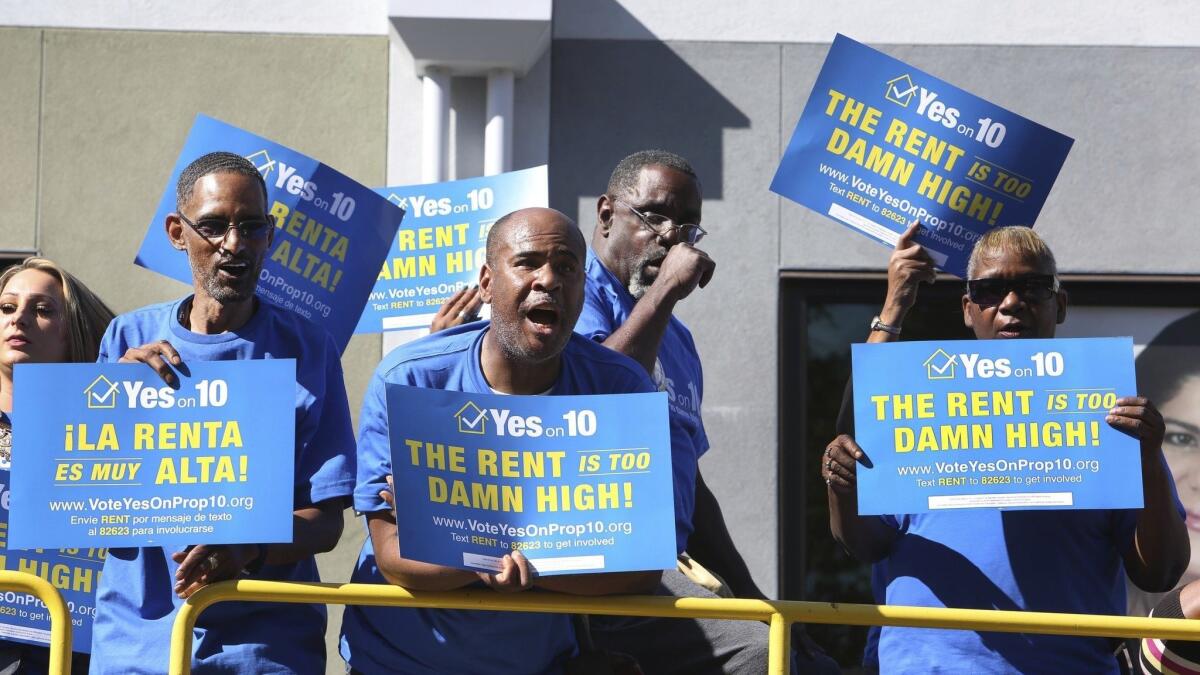Voters reject Proposition 10, halting effort to expand rent control across the state

- Share via
Reporting from Sacramento — Proposition 10, a ballot measure to expand rent control in California, was decisively rejected by voters Tuesday in a victory for the state’s top landlords who spent millions to defeat it.
The campaign was one of the most expensive initiative battles in California history with more than $104 million in total fundraising. With Proposition 10’s failure, a statewide ban on most new forms of rent control remains in effect.
“The stunning margin of victory shows California voters clearly understood the negative impacts Prop. 10 would have on the availability of affordable and middle-class housing in our state,” Tom Bannon, CEO of the California Apartment Assn., said in a statement.
It’s expensive to be a tenant in California. Will Proposition 10’s rent control expansion help? »
The campaign to expand rent control was pitched to voters as housing has become less affordable in the state. About 9.5 million renters — more than half of California’s tenant population — are burdened by high rents, spending at least 30% of their income on housing costs, according to a UC Berkeley study.
To address the issue, tenant advocates decided to go after the Costa-Hawkins Rental Housing Act, a state law passed 23 years ago that blocks cities and counties from imposing rent control on single-family homes and apartments built after 1995, among other prohibitions. After a bill to repeal Costa-Hawkins failed in a legislative committee in January, groups turned in signatures for a ballot measure, Proposition 10, that would have done the same thing. Had the initiative passed, local governments would have been free to add new restrictions on rents, something Los Angeles, Berkeley and other cities were considering.
But polling showed Proposition 10 never really caught on with voters. A September survey from the nonpartisan Public Policy Institute of California revealed just 36% of likely voters backed the initiative. A month later a poll from the same organization showed support had decreased to 25%.
That drop came amid a blitz of TV advertisements from opponents who, as of Friday, had raised nearly $80 million to defeat Proposition 10. They argued that expanding rent control would increase the state’s housing shortage, exacerbate overall affordability issues and hurt the investments of single-family homeowners. Much of the funding for the No on 10 campaign came from national real estate investors with large apartment portfolios in California.
The Proposition 10 campaign was watched beyond California’s borders. Market analysts have paid close attention to the campaign, which had the potential to spur similar rent control measures across the country. The National Multifamily Housing Council, an apartment industry group, called Proposition 10 an “existential threat to the industry.”
Supporters of Proposition 10 raised $24.6 million, 94% of it coming from the AIDS Healthcare Foundation, a Los Angeles-based nonprofit. Backers contended that the initiative offered the quickest and cheapest way to provide housing cost relief for renters, and that cities and counties should be allowed to tailor rent stabilization rules to their communities.
Michael Weinstein, president of the AIDS Healthcare Foundation, said the campaign revealed the influence that corporate landlords have over the state’s housing market.
“They may be enjoying their victory at the polls tonight,” Weinstein said. “But this campaign exposed who they are and what they represent.”
The AIDS Healthcare Foundation, which has argued that housing stability is crucial to its mission of serving low-income AIDS patients, now has lost four high-profile California and Los Angeles ballot measures it’s bankrolled since 2016. Voters have also rejected statewide efforts to limit prescription drug prices and mandate the use of condoms in adult films and a Los Angeles measure to slow growth in the city.
Despite Proposition 10’s defeat, rent control is likely to remain in the spotlight. Residents in Sacramento, the state’s sixth-largest city, have qualified a 2020 initiative that would implement rent controls on the city’s older apartment buildings. Democrat Gavin Newsom, who was elected governor on Tuesday, opposed Proposition 10, but he has said the state should have stronger protections for tenants.
AIDS Healthcare Foundation officials have said that if Proposition 10 didn’t pass they would immediately begin discussing whether to push a stronger rent control measure for the 2020 statewide ballot. After the results came in Tuesday night, Weinstein said he wanted to work with Newsom first.
“Gavin Newsom, who is the incoming governor of California, has said affirmatively that he intends to solve this problem. I take that at face value. It’s incumbent upon us to exhaust that opportunity before we go to the ballot again.”
Coverage of California politics »
UPDATES:
11:45 p.m.: This article was updated with quotes from an interview with Michael Weinstein, which replaced written statements from Proposition 10 supporters.
10:12 p.m.: This article was updated with a quote from Proposition 10 proponents.
This article was originally published at 9:45 p.m.
More to Read
Get the L.A. Times Politics newsletter
Deeply reported insights into legislation, politics and policy from Sacramento, Washington and beyond. In your inbox three times per week.
You may occasionally receive promotional content from the Los Angeles Times.











